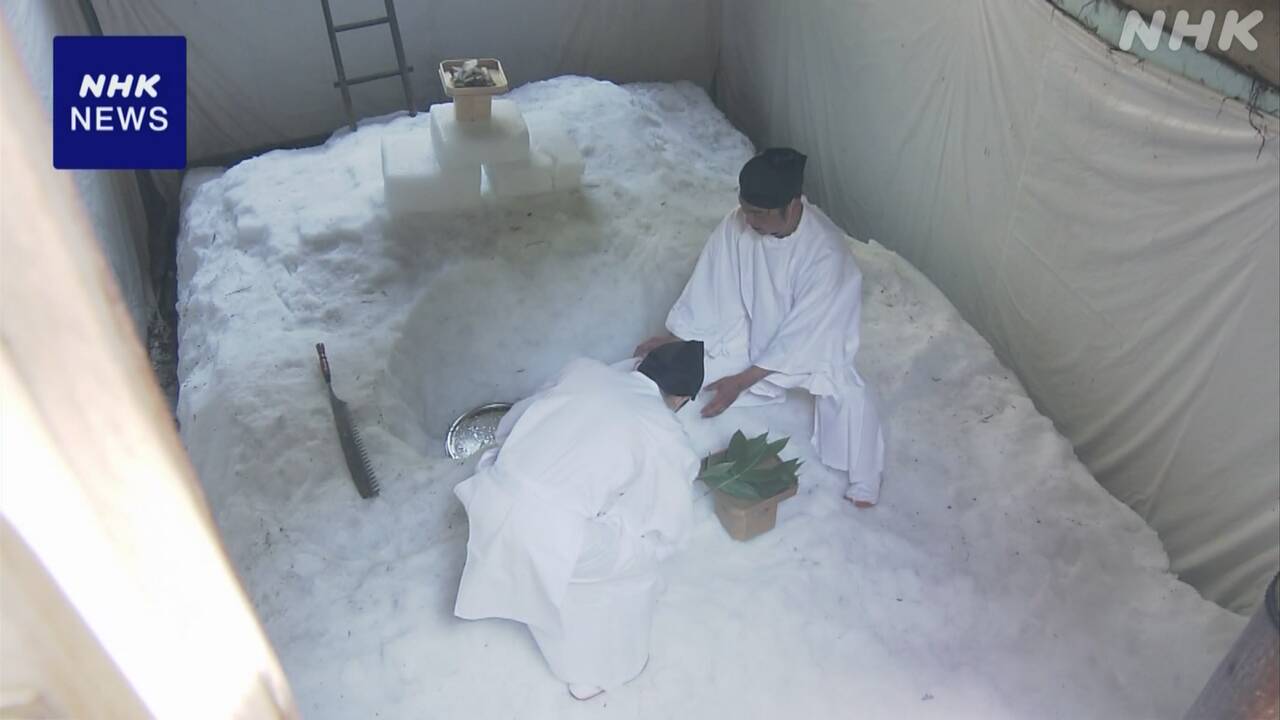Published: 2025-06-30 17:37
金沢 湯涌温泉で「氷室開き」

金沢市の湯涌温泉で、暑い夏に涼を味わうため、冬の間に貯蔵しておいた雪を取り出す「氷室開き」が行われました。
「氷室」は、冬に積もった雪を保存しておく、かやぶきの貯蔵庫で、江戸時代、金沢では旧暦の6月1日に雪が取り出され、加賀藩から徳川家に献上されていたとされています。
6月30日、金沢市の湯涌温泉で観光客や地元の園児が集まる中、当時の様子を再現した「氷室開き」が行われ、近くの寺の住職が法要を行って自然の恵みに感謝したあと、氷のように押し固められていた雪が切り出されました。
金沢市では、最高気温が30度以上の真夏日となる中、訪れた人たちは冷たい雪に触れるなどして、ひとときの涼を楽しんでいました。
切り出された雪は、県庁や金沢市役所のほか、江戸時代に加賀藩の屋敷があった東京の板橋区や文京区などにも届けられるということです。
参加した4歳の女の子は「雪の表面はつるつるした感触で、心地よく感じられました」などと話していました。
参加した金沢市の70代の男性は「自然を生活に役立てる昔の人の知恵はすごいと思います」と話していました。
| # | 言葉 | 意味 |
|---|---|---|
| 5 | 金沢市 | かなざわし (金沢市) : Kanazawa City (Ishikawa Prefecture) (place) |
| 3 | 氷室 | こおりむろ (氷室) : ice house; ice room; cold room |
| 3 | 行う | おこなう (行う) : to perform; to do; to conduct oneself; to carry out |
| 2 | 涌 | わく (涌) : Waku (surname) |
| 2 | 温泉 | おんせん (温泉) : 1. hot spring 2. onsen; hot spring resort; hot spring spa |
| 2 | 涼 | りょう (涼) : cool breeze; cool air; refreshing coolness |
| 2 | 取り出す | とりだす (取り出す) : 1. to take out; to produce; to pick out 2. to fetch; to retrieve |
| 2 | 開き | ひらき (開き) : 1. opening; gap 2. dried and opened fish |
| 2 | 江戸時代 | えどじだい (江戸時代) : Edo period (1603-1868 CE) |
| 2 | 加賀 | かが (加賀) : Kaga (former province located in the south of present-day Ishikawa Prefecture) |
| 2 | 自然 | しぜん (自然) : 1. nature 2. natural; spontaneous; automatic |
| 2 | 切り出す | きりだす (切り出す) : 1. to quarry; to cut (timber); to cut and carry off 2. to begin to talk; to break the ice; to broach |
| 2 | 参加 | さんか (参加) : participation; joining; entry; adherence |
| 2 | 話す | はなす (話す) : 1. to talk; to speak; to converse; to chat 2. to tell; to explain; to narrate; to mention; to describe; to discuss |
| 1 | 味わう | あじわう (味わう) : 1. to taste; to savor; to savour; to relish 2. to appreciate; to enjoy; to relish; to digest |
| 1 | 貯蔵 | ちょぞう (貯蔵) : storage; preservation |
| 1 | 積もる | つもる (積もる) : 1. to pile up; to accumulate 2. to estimate |
| 1 | 保存 | ほぞん (保存) : 1. preservation; conservation; storage; maintenance 2. saving (e.g. to disk) |
| 1 | かやぶき | かやぶき (茅葺き) : thatch roof; thatching a roof with grass |
| 1 | 貯蔵庫 | ちょぞうこ (貯蔵庫) : storehouse; bunker; silo |
| 1 | 金沢 | かなざわ (金沢) : Kanazawa (city in Ishikawa) |
| 1 | 旧暦 | きゅうれき (旧暦) : Japan's old (lunisolar) calendar |
| 1 | 徳川家 | とくがわけ (徳川家) : the House of Tokugawa; the Tokugawas |
| 1 | 献上 | けんじょう (献上) : presenting to |
| 1 | 観光客 | かんこうきゃく (観光客) : tourist |
| 1 | 地元 | じもと (地元) : 1. home area; home town 2. local |
| 1 | 園児 | えんじ (園児) : kindergarten pupil; kindergartener |
| 1 | 集まる | あつまる (集まる) : to gather; to collect; to assemble |
| 1 | 当時 | とうじ (当時) : at that time; in those days |
| 1 | 様子 | ようす (様子) : 1. state; state of affairs; situation; circumstances 2. appearance; look; aspect |
| 1 | 再現 | さいげん (再現) : 1. reappearance; reemergence; return; revival 2. reproduction; reenactment; recreation |
| 1 | 住職 | じゅうしょく (住職) : chief priest (of a Buddhist temple) |
| 1 | 法要 | ほうよう (法要) : Buddhist memorial service |
| 1 | 恵み | めぐみ (恵み) : blessing; grace |
| 1 | 感謝 | かんしゃ (感謝) : thanks; gratitude |
| 1 | 氷 | こおり (氷) : 1. ice 2. shaved ice (usually served with flavored simple syrup) |
| 1 | 押し固める | おしかためる (押し固める) : to press together |
| 1 | 最高気温 | さいこうきおん (最高気温) : maximum temperature; highest temperature; (today's) high |
| 1 | 真夏日 | まなつび (真夏日) : day on which the temperature rises above 30 degrees Celsius |
| 1 | 訪れる | おとずれる (訪れる) : 1. to visit; to call on 2. to arrive (season, time, situation, etc.); to come; to appear |
| 1 | 触れる | ふれる (触れる) : 1. to touch; to feel 2. to touch (with) |
| 1 | ひととき | ひととき (ひと時) : 1. a (short) time; a while; moment 2. one time (in the past); a period; former times |
| 1 | 楽しむ | たのしむ (楽しむ) : to enjoy (oneself) |
| 1 | 県庁 | けんちょう (県庁) : prefectural office |
| 1 | 役所 | やくしょ (役所) : government office; public office |
| 1 | 屋敷 | やしき (屋敷) : residence; estate; grounds; premises; mansion |
| 1 | 東京 | とうきょう (東京) : Tokyo |
| 1 | 板橋区 | いたばしく (板橋区) : Itabashiku (place) |
| 1 | 文京区 | ぶんきょうく (文京区) : Bunkyouku (place) |
| 1 | 届ける | とどける (届ける) : 1. to deliver; to forward; to send 2. to report; to notify; to file notice (to the authorities); to give notice; to register |
| 1 | 表面 | ひょうめん (表面) : 1. surface; face 2. outside; exterior |
| 1 | つるつる | つるつる : 1. smooth; shiny; slick 2. slippery; greasy |
| 1 | 感触 | かんしょく (感触) : feel (i.e. tactile sensation); touch; feeling; sensation; texture (e.g. food, cloth) |
| 1 | 感ずる | かんずる (感ずる) : to feel; to sense |
| 1 | 役立てる | やくだてる (役立てる) : to put to use; to make use of; to turn to account |
| 1 | 知恵 | ちえ (知恵) : 1. wisdom; wit; sagacity; sense; intelligence 2. prajna (insight leading to enlightenment) |
| 1 | 思う | おもう (思う) : 1. to think; to consider; to believe; to reckon 2. to think (of doing); to plan (to do) |